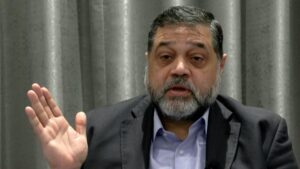Overnight Israeli airstrikes kill 200 people in Gaza
South Africa joins Turkiye, Jordan, Bolivia, Honduras, Colombia, Chile, and Bahrain recalling diplomats form Israel
GAZA, Palestine – Israeli airstrikes continued bombing resulting in the death of 200 people overnight in Gaza, according to statements from the Palestinian Health Ministry.
This toll arises from a series of airstrikes targeting various locations within the region.
The ministry reports fatalities in different parts of Gaza, with significant numbers in Khan Younis and Tal az-Zatar.
The Israeli army has conducted over 450 airstrikes in a short time frame.
One of the strikes in central Gaza demolished three residential buildings, causing at least 45 deaths. Additionally, the airstrikes obliterated Gaza’s sole mental health center.
A pediatric hospital in Gaza City, treating children with cancer, sustained damage on its third floor during the assaults. The health ministry also cites that airstrikes on several hospitals in Gaza City led to the death of eight Palestinians, four each at the al-Rantisi pediatric hospital and Gaza’s Eye Hospital.
Saleh al-Jafarawi, a Palestinian activist, has disseminated videos on Instagram showing the intense overnight bombardment in Gaza.
Elsewhere, in the occupied West Bank and East Jerusalem, two Palestinians were killed by Israeli forces. Concurrently, a stabbing attack in Jerusalem’s Old City resulted in the death of Israeli police officer and left another wounded.
The assailant, a 16-year-old from East Jerusalem, was fatally shot at the scene.
In a separate development, more than 200 Indian Jews from the Bnei Menashe community have immigrated to Israel and were summoned for military service, as per the Shavei Israel nonprofit.
The United Nations reports an unprecedented loss of 88 staff members in Gaza, calling for an immediate humanitarian ceasefire—a sentiment echoed by 18 UN and other humanitarian organizations.
In response to the crisis, Jordan has dispatched urgent medical aid to Gaza.
So far as many as 9,900 Palestinian lives have been claimed in Gaza and the occupied West Bank since the conflict’s escalation on October 7.
Hamas’s attacks on Israel have resulted in the death of over 1,400 people.
International response
Amidst these events, South Africa has withdrawn all its diplomats from Israel for consultations. The decision comes amidst growing concerns about the ongoing violence in the Palestinian territories.
During a press briefing, Khumbudzo Ntshavheni, a minister in the president’s office, conveyed the government’s decision to call back all diplomatic staff currently based in Tel Aviv.
The move is a clear expression of South Africa’s deep concern over the continued loss of innocent lives, including children, in the Palestinian territories.
Foreign Minister Naledi Pandor said his country is extremely concerned at the continued killing of children and innocent civilians in the Palestinian territories.
She said the nature of Israel’s response has evolved into a form of collective punishment.
So far Turkiye, Jordan, Bolivia, Honduras, Colombia, Chile, and Bahrain have also recalled their diplomats from Israel in response to the ongoing crisis.
Additionally, Bolivia has severed all diplomatic ties with Israel, citing the atrocities in Gaza as the reason behind this drastic measure.
Jordanian Foreign Minister Ayman Safadi expressed his concerns about the Israeli government’s approach to peace negotiations.
Safadi noted that the Israeli government has displayed “no interest” in pursuing peace, highlighting a disturbing remark made by an Israeli cabinet member about the possibility of dropping a nuclear bomb on Gaza.
Blinken visit
Meanwhile, U.S. Secretary of State Antony Blinken met with his Turkish counterpart, Hakan Fidan on Monday.
While no joint statement was issued, official sources say they discussed key issues, including the Gaza conflict and a prisoner exchange between Hamas and Israel.
The U.S. urges Turkiye to pressure Hamas for captive releases, but Turkiye insists on a mutual release of captives by both sides.
The Turkish side also called for an unconditional ceasefire with international monitoring, with Ankara as the guarantor.
Blinken referred to a “humanitarian pause,” but Turkiye found this insufficient.
Turkish President Recep Tayyip Erdogan chose to visit a remote region in the northeast of the country, choosing not to meet Blinken.
CIA Director Bill Burns is also touring the region meeting leaders and his counterparts.
Protesters gathered in front of the Turkish Foreign Ministry, accusing the U.S. of complicity in Palestinian civilian deaths.
On Sunday Turkish police used tear gas and water cannons to disperse pro-Palestinian protesters at Incirlik air base in southern Turkey.
The Pentagon announced deploying a submarine to the Middle East, adding to the U.S. military presence in the region.
The Eisenhower strike group joined the USS Gerald R. Ford carrier strike group in the Mediterranean.










